Getting into film scoring is about research, education, developing your composing chops, and building a suitable home studio/composition setup. The best way to become a film composer is to work at it daily and make step-by-step goals that slowly lead to more substantial ones.
Getting Into Film Scoring
With all the different skill sets required for being a film composer, getting into film scoring can seem daunting.
However, if you can identify what it takes to score a film and make goals to work at, you can become a confident and competent film composer.
Although it takes a serious investment of time, I have followed this process and gotten hired for several film scoring jobs, including a full-length feature film.
Today I will show you some tips, tricks, and strategies for getting into film scoring.

Diving Right In
Without wasting any time, let’s start breaking down the different focus areas in being a film score composer and how you can get started.
All this information may seem a bit overwhelming at first, but remember that the journey to being a great film scorer is about patience and slowly working at your goals day by day.
Equipment Needed To Be Film Composer
First, let’s look at the gear you will need for your home studio to start learning how to compose for film.
Thankfully, this list isn’t too long, and you don’t have to have the nicest equipment if you are just getting started.
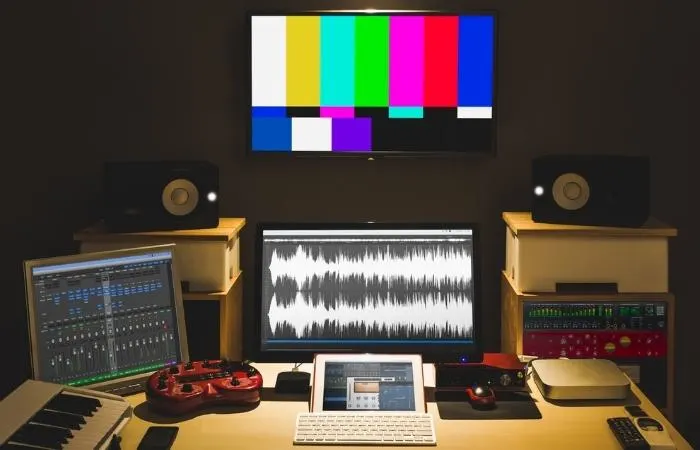
Here’s what you will need:
- Laptop/desktop computer
- DAW (Digital Audio Workstation)
- Headphones or studio monitors
- MIDI keyboard
- MIDI control surface
- A microphone or two
- A few samples/virtual instruments to work with
There will be plenty of other gear you will want to add to your studio setup as you go. Still, the abovementioned kit is all you will need to get started.
Computer
As far as a computer goes, you can use either a laptop or desktop as long as it is compatible with the type of DAW you plan on using.
For example, you can only use Logic Pro on Apple devices since it is an Apple-exclusive product.
In film composition and music production in general, having a powerful computer is super helpful for running big projects with a bunch of plugins.
With that said, if you are new to film scoring, you can get by as long as your computer has at least 8GB of RAM (Random Access Memory).
Anything less than this, you will have enormous trouble running your DAW and using VST plugins/virtual instruments.
You can begin your film scoring journey with almost any computer, but you will want to think about investing in something with plenty of RAM if you are serious about film composition.
Check out this complete guide to building a computer for music production.
DAW
The next piece of gear that you will need is a digital audio workstation to compose and produce in.
There are tons of different DAWs available, but some of the most popular amongst film composers are Logic Pro, Cubase, and Pro Tools.
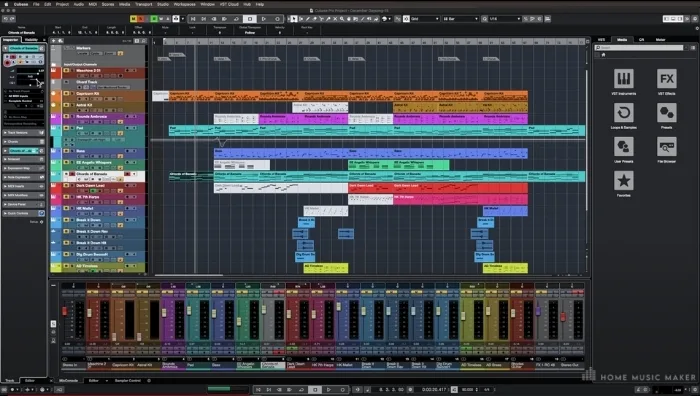
Although these DAWs are some of the more industry-standard software film composers use, you can use any DAW with video compatibility to get into film scoring.
For example, I use REAPER for film composition, although it is not the most popular DAW for film composers; in my opinion, it has all of the features you might need to score to film.
While it is definitely wise to learn an industry-standard DAW to get into film scoring, any DAW with video compatibility that you are comfortable using will be perfect for getting you started.
Headphones/Studio Monitors
Obviously, you won’t be able to write music for a film without hearing it, so the next piece of equipment you will need is a pair of headphones or studio monitors.
You are good to go if you already have means of monitoring music in your DAW. Still, I want to provide a couple of recommendations to those of you who do not.
Keep in mind that the recommendations I’m giving here are on the low end as far as price goes since this is a beginner’s guide.
Headphones
These AKG headphones are an excellent low-cost option if you need headphones in a pinch.
The Sennheiser HD PRO series offers a decent pair of headphones for a reasonable price.
Studio Monitors
KRK Rokit 5s are a great option for studio monitors for music production/film composition beginners.
Yamaha HS5s are a reliable pair of speakers made by a well-known company.
MIDI Keyboard
Another essential piece of gear that you will need is a keyboard with MIDI compatibility to play virtual instruments and sample libraries.
If you have an old keyboard lying around with a MIDI output jack (either USB or 5-pin MIDI), this will do the trick! If not, you will have to invest in one.
Serious film composers will want a MIDI keyboard with 88 weighted keys, MIDI faders, and other controls.
Still, a basic MIDI keyboard will be enough to get you going with film scoring if you are a beginner.
Here are a few low-cost recommendations for MIDI keyboards for film scoring beginners:
This MIDI keyboard from M-Audio has 49 keys and a few modulation controls. It is a great beginner keyboard.
This Alesis MIDI keyboard also has 49 keys and a simple display/setup. Another excellent choice for a music production beginner.
The Novation Launchkey comes in at a bit of a higher price point than the other two options listed above but has quite a few more features such as MIDI pads, faders, etc.
It can be nice to have a top-of-the-line MIDI keyboard, but it is unnecessary; even a simple MIDI keyboard can get the job done!
MIDI Control Surface
The next piece of gear that you will want to invest in is a MIDI control surface.
A MIDI control surface is a MIDI-compatible device with knobs and faders that you can use to modulate different parameters on virtual instruments such as dynamics, expression, vibrato, or almost anything else you want to control.
This type of MIDI controller is essential for adding realism to orchestral samples.
Here are some options for a few decent MIDI control surfaces at a low cost:
Btuty Portable MIDI Controller
Although I have not heard much about this manufacturer, this MIDI control surface has decent reviews and a very low price.
I recommend the Korg Nanokontrol 2 and believe it is an excellent MIDI controller; this is the MIDI control surface I am currently using.
The Studiologic SL Mixface is slightly more pricey than the other MIDI controllers. It does feature a lovely display and all of the features you would expect from a MIDI control surface.
If you do not have much money to invest in your setup, a MIDI control surface is one of the things that you can acquire later on.
The most critical pieces of gear that you will need are a computer, a DAW, a pair of headphones/studio monitors, and a MIDI keyboard.
Microphones
Something else that you will want to add to your film composition equipment list is a decent microphone or two.
While sampled/virtual instruments are an important part of the modern composer’s toolkit, microphones are essential for recording your own instruments and sounds which help you build your distinct style as a composer. You don’t want to rely only on other people’s sounds.
My end-all-be-all choice for a beginner instrument microphone is the Shure SM57.
I still use these bad boys all the time in my productions, and they are available to you at a very reasonable price.
Don’t get stuck only using sample library instruments. Create your own sounds!
Virtual Instruments/Sample Packs
The last thing you want to acquire as a beginning film composer is a decent collection of virtual instruments and sample packs to use in your compositions.
In my opinion, Spitfire Audio makes the best cinematic sample libraries.
Spitfire even offers a collection of free sampled instruments called Spitfire LABS.
On top of these sampled instruments being available to you for no charge, the LABS collection’s sounds are incredible!
Another source for some fantastic and free sampled instruments is Native Instruments Komplete Start.
This collection offers a ton of awesome sounds and samples at no cost.
While it may be necessary at some point to invest in some high-end sample libraries/instruments, these collections of free sounds are more than enough to get you started on scoring to film!
Education/Research
The next thing to focus on in your film scoring journey is some research and education that will help you learn what it takes to write music for film.
Let’s go over the different things you will need to learn to get into film scoring.
Music Theory
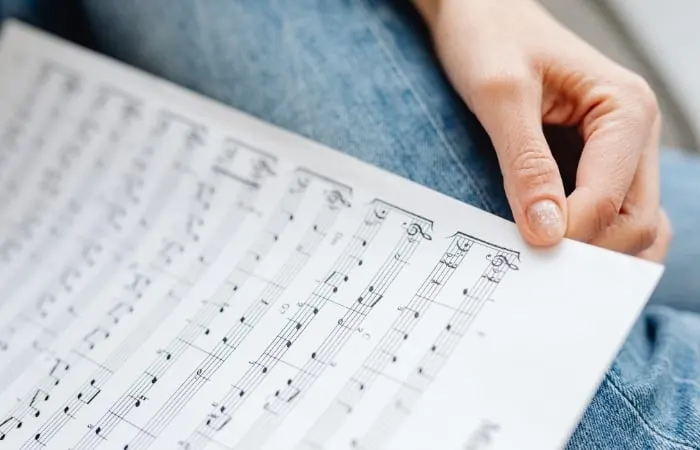
You don’t need to be a music theory expert to get into film scoring, but I do think it is essential to learn at least the basics.
You will have trouble writing quality music and collaborating with other composers/musicians without a rudimentary knowledge of music theory.
You should be careful what information you choose to study, but there are some incredible free resources for music theory on the internet, YouTube especially!
Here is a list of some basic music theory concepts that you might want to know as a film scorer:
- Rhythm and timing
- The musical staff and how to read/write music at a basic level
- The circle of fifths (what it is and how you can use it)
- Musical dynamics
- Chords and building chord progressions
- Basic scales and intervals
Taking some time to learn the music theory fundamentals can do wonders for your composition skills.
Arrangement
The arrangement is another definite topic of interest when learning about film composition and songwriting in general.
If you are a big movie watcher, you’ve probably noticed that different films feature different arrangements and instruments.
For example, if you are watching a big Hollywood blockbuster, chances are the score will feature a vast orchestra, pounding percussion, and maybe even some electronic elements.
However, other films will feature a more stripped-down and raw score.
Sometimes this is an intentional move, and sometimes it just has to do with the film’s budget.
It is important to watch films with different types of scores to study and analyze what other instruments sound like, when a composer might use them, and what they can do for a scene in a movie.
To be a good film composer these days, you must be able to tackle many different styles of music and musical arrangements.
Of course, everyone has strengths and weaknesses, but it’s best to be adaptable in the film composition industry.
Film Score Placement
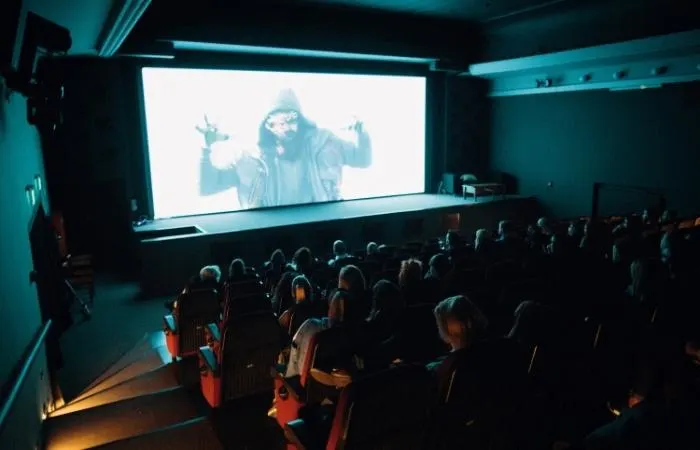
This next topic involves simply watching movies and paying attention to when the score comes in, drops out, and what it does emotionally for the film’s story.
What scenes have music? What scenes did the director and composer decide to scoreless? Why did they make these decisions?
The best way to learn how to score a film is by studying what the masters have already done and internally applying it to your film composing process.
Although developing your own composing style and sound is pretty important, there is nothing wrong with learning from the greats.
The Business End
One of the most important things to learn about if you are serious about getting into film scoring is the business end of things.
This might not come up until you are a few years or longer into your journey of getting into film composition, but it is important to know when the time comes.
Suppose you are starting to get offers to work on projects with big payouts and significant responsibilities on your end. In that case, it might be a good idea to start working with an agent.
However, if you are just starting or working on small-time projects, you will probably be able to handle your own business as long as you are smart about it.
You must know what you are doing when writing music for someone’s film; you don’t want to lose the rights to your music or end up on the wrong side of an unfair deal.
Mastering The DAW (Digital Audio Workstation)
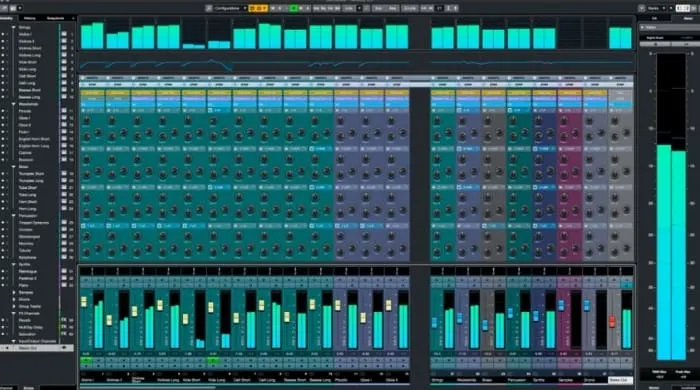
Knowing how to compose and produce music using a DAW is almost completely necessary in modern film composition.
A DAW allows us to write music to moving pictures using live and sampled instruments and quickly and easily share scored scenes with the director/production team for review.
This is much faster than writing a score on staff paper and playing it for your director on piano!
Regarding what DAW you should use for getting into film scoring, this is mostly up to you as long as it supports video files and not just audio.
Something to keep in mind, though, if you are serious about getting into film composition as more than just a hobby, is that some DAWs are more widely used in the film composition community and are more industry standard.
For example, Logic Pro, Pro Tools, and Cubase are the most common DAWs used by film composers.
With that said, you may want to learn one of these DAWs if you’re going to make a career in film composition or try to land a job assisting a composer.
If you are unwilling to learn how to use a digital audio workstation to compose film music, you will likely fall behind in today’s industry.
Practicing And Honing Your Composing Chops
Probably the most important thing to focus on when it comes to getting into film scoring/film composition is developing your composing/songwriting skills.
The best way to do this is to write music and practice composing daily.
Unlike writing music on the side or for your own album, you must follow strict deadlines in film composition.
Because of this, you need to be able to pump out music for a film score when the time comes; there’s no waiting around for inspiration.
Thankfully, if you take the time each day to practice writing music of different styles and instrumental arrangements, you will develop an ability to come up with musical ideas much easier than other musicians.
This will make it so that you can handle the intense workload that sometimes comes with writing a score for a film.
The only way to become a competent film composer is to practice and hone your composing/songwriting chops.
Film Scoring For Beginners
Here are some of the things to focus on if you are a beginner in film scoring:
- Educating yourself on common film composition tactics and strategies as well as at least a basic level of music theory
- Researching other film scores by watching/analyzing films and applying this information to your music composition
- Building up an adequate home studio/music composition setup
- Networking with local filmmakers and film composers to form working relationships
- Developing your composing and songwriting chops by practicing daily
- Mastering the art of working on music in a DAW (Digital Audio Workstation)
There are many aspects to becoming a good film composer, and they all take dedication and time to master.
You cannot become a successful film composer if you are not patient enough to see it through.
How To Get Film Scoring Jobs

There is no set way to land a film scoring job. It’s part skill, part ambition, and part luck!
Here are some tips and tricks that I have used to land film scoring jobs:
- Use social media to share your music composition journey and build an audience of members of the filmmaking community.
- Attend local film festivals and try to form relationships with filmmakers and directors
- Record and release an album that encompasses your unique composition style to catch the ear of potential collaborators hopefully
- Be bold and directly reach out to directors that you might like to work with (this is how I landed my first full-length feature film project)
- Get a job assisting an already successful film composer; this will help get you in the industry and on the path to doing your own scores.
Landing a gig scoring a film can take some serious time. Be patient and play your cards right and you will outlast the others and find success!
How Much Do Film Scorers Make?
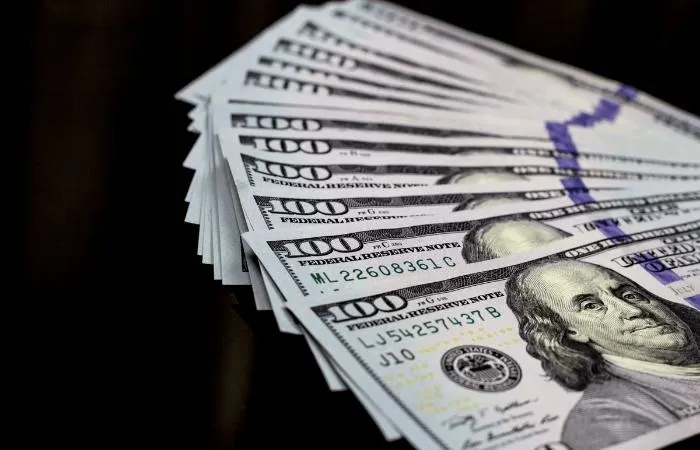
While there is no standardized rate for scoring a film, the average salary for a full-time film composer ranges from about $20,000 on the low end to up to $500,000 on the top end.
This is a vast range, and it mostly depends on the frequency and size of projects you work on.
Composers such as Hans Zimmer, Danny Elfman, John Williams, etc., make millions of dollars for a single score depending on the specific film.
The film industry is competitive, and building up a viable income as a working film composer can take some serious time, development, and networking.
That said, getting into film scoring is not for the faint of heart.
Do Composers Get Royalties?
Yes, composers receive royalties for their musical pieces in TV shows or films. These royalties are typically split 50/50 between the songwriter and the publisher.
This has been a standard practice for quite a while and is one of the main ways composers can earn a living.
Royalties make up a considerable portion of a composer’s income.
However, a recent trend has been reported by composers in which streaming services are trying to buy out musical rights and only pay a one-time fee on the front end with no royalties on the back end for film scoring jobs.
Although streaming services are dismissive about this taking place and argue that these deals are still fair, I believe that giving up the rights to our music is ultimately harmful to the composer community and will hurt our ability to earn a viable living in the long run.
How Much Do TV Composers Make?
According to music lawyers Jeff and Todd Brabec, a composer can expect to make $277,500 in the first season of a one-hour network show, $330,000 in the second season, and up to $500,000 over three years in royalties if the show is successful.
However, most of this money does not come on the front end and is mainly paid in public performance royalties through a performance rights organization such as ASCAP, BMI, PRS, etc.
This is why we, as film composers and music producers need to retain the rights to our music that plays in film and TV.
How Hard Is It To Become a Film Scorer?
Becoming a film composer is not an easy task. It requires mastering several different skill sets and abilities.
Not only this, but it also takes quite a lot of time (several years or more) to become a competent full-time film composer.
If you dream of scoring films and are looking into becoming a film composer, get ready to invest a lot of time and energy because it will not happen overnight!
It will take years and years of hard work.
How Long Does It Take To Score a Film?
The short answer is; as long as you have.
Being a successful film composer is about delivering a quality score for your director on time and budget.
That said, sometimes you will land a scoring job on a film with a few years to work on it, and sometimes you will have a few weeks.
This all depends on the specific production and its timeline.
Do You Need a Degree To Score Movies?

Having a degree in music composition can be helpful when it comes to scoring movies, but it is not necessary by any means.
This isn’t to say you can score a film successfully without any education. It’s just that there are other ways to go about learning, such as online resources and masterclasses, books written on the subject, apprenticeships under successful composers, etc.
There are plenty of very successful film composers who do not have a music degree. For example, Hans Zimmer and Danny Elfman did not attend university for their musical studies. They found other ways to enrich themselves culturally and musically.
There are huge benefits to attending university for music composition, but it is also not necessary for becoming a successful film composer. The most common way to become a successful and respected film composer is to get an apprenticeship/mentorship under an already successful composer.
Is There a Demand For Composers?
Because the film industry is so competitive, I can’t say there is a massive demand for composers.
Thankfully though, because of how many streaming services there are these days pumping out new content, there is more opportunity in film/TV composition these days than there ever has been.
Although film composition is not an easy industry to tap into, it is possible to find your place in it if you are hardworking, determined, and highly patient. The best way to find success in something is to outlast the others!
Do Film Composers Have Agents?

This depends on the success level of the film composer.
You might not need to work with an agent at an early stage in your career if negotiations are simple enough and the project isn’t too big.
However, once you reach a certain point, having an agent will definitely be the move. Agents don’t always find you work or propel your career that way, but they will go to bat for you and make sure you get a fair deal on any project offered to you.
How Do I Become a Netflix Composer?

Unfortunately, it’s not quite possible to just ‘become a Netflix composer.’
Becoming a successful composer in any regard is not an easy task and takes years of practice, determination, and hard work.
If you want to score a Netflix film, you will need to hone your composer chops, network with directors and filmmakers in the industry, and prove yourself as a competent film composer by getting a few score credits under your belt and maybe even finding an apprenticeship under a successful film composer.
With Netflix being one of the most popular streaming services, getting hired to score a Netflix film is not an easy or overnight task; a director whose movie will be on Netflix isn’t going to hire just anybody to write the score.
Why Is It Called a Film Score?
A musical score refers to a written piece of music. Therefore, a film score is a piece of music written to play in a film.
Film scores work to accompany the moving images of a movie.
Related Questions
What Qualifications Do You Need To Be a Film Composer?
There are no official qualifications for becoming a film composer. It is much more about who you know and what you can bring to a film production team.
While a degree in music composition can help one become a film composer, it is certainly not necessary. If you are a savvy and personable musician with a strong work ethic and sense of patience, you can potentially go far as a film composer.
Is a Film Score Different From a Movie Soundtrack?
A film score refers to the instrumental music written for a film by a film composer specifically for that film.
A soundtrack refers to the combination of a film’s score and any lyrical songs in the movie.
Some films are more score-heavy while others feature more lyrical songs; this usually depends on the genre of the film.
Is Scoring a Film a Stressful Process?
There is no point in sugar-coating it. Scoring a film can be very stressful, depending on a few circumstances.
Timeline, workload, client relations, etc., all play a role in whether or not scoring a film will be stressful.
For example, I have worked on stress-free projects where I’ve had a whole year to develop a score. I’ve also worked on seriously stressful projects where I’ve had only a couple of weeks.
Being a good film composer is all about being ready to roll with the punches and get the job done.
Who Are Some Of The Most Famous Film Composers?
Some of the most famous film composers are John Williams, Hans Zimmer, Danny Elfman, Trent Reznor, and Alan Silvestri.
Although there are countless famous film composers worldwide, these are some of the most renowned.
Ready for more?! Check out this article discussing is music production hard?

 Want to connect with other music producers for help and guidance?
Want to connect with other music producers for help and guidance?